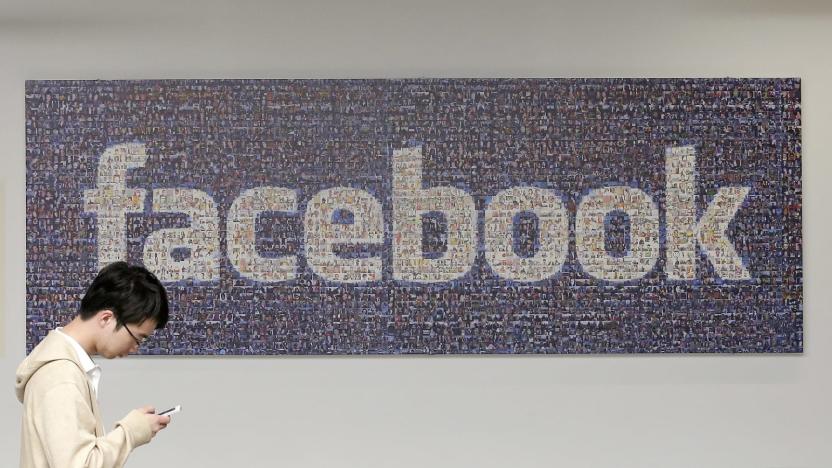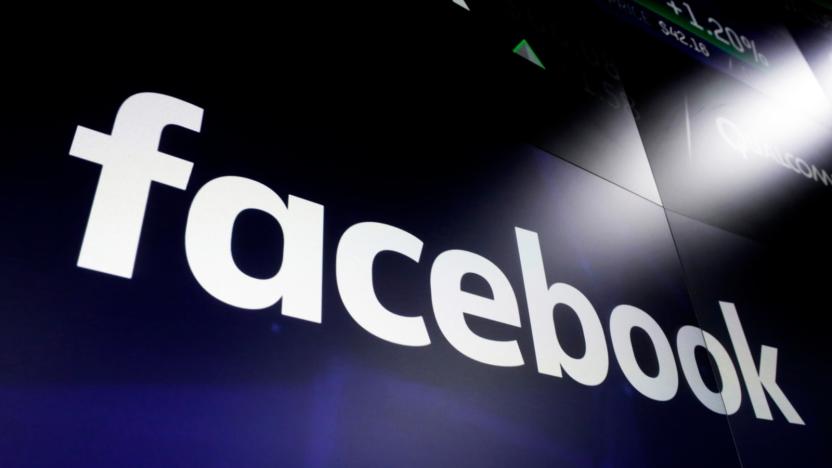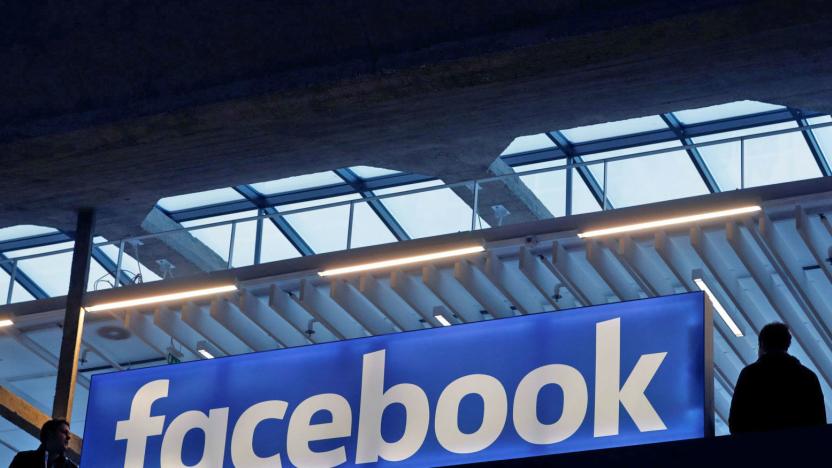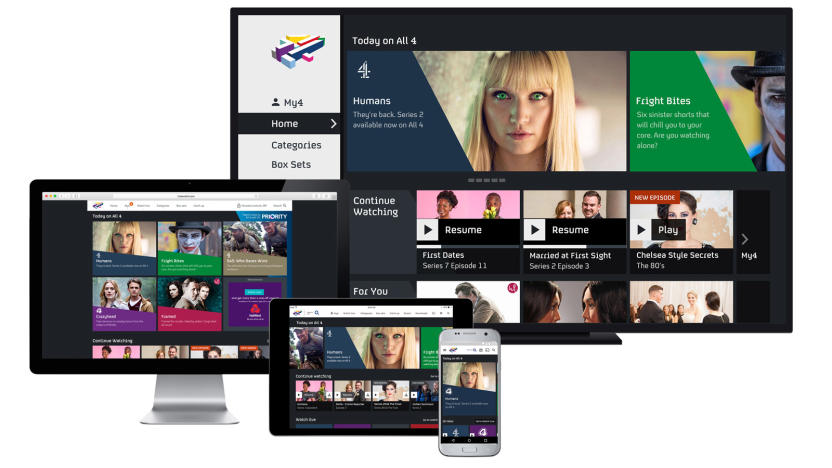targetedadvertising
Latest

Oculus is rolling out its expanded social VR features
Along with Quest hand tracking, one of Facebook's big announcements at Oculus Connect 6 in September was a batch of social VR features. You'll get to try them over the coming days, as Oculus is starting to roll them out.

Facebook will be liable for future Cambridge Analytica-style scandals
Facebook is updating its terms and conditions after agreeing several changes with the EU. It will have to clearly explain to users they can access the social network for free because it uses targeted ads that rely on user data. Facebook will also have to disclose what revenues it generates through the use of such data.

Senate bill proposes stricter privacy controls for children
Some politicians don't believe the Children's Online Privacy Protection Act does enough to protect kids in the modern era, and they're hoping to update it accordingly. Senators Ed Markey and Josh Hawley have introduced a bill that would amend COPPA with stricter controls on kids' data. It would ban ads targeted at kids, and would require an "Eraser Button" that would let kids and parents wipe data. The measure would still ban the collection of personal data for kids under 13 without their parents' consent, but it would also ban collecting data from the 13- to 15-year-old crowd without the user's permission.

Facebook will show who uploaded your contact info for targeted ads
Facebook has taken some steps to prevent companies from recklessly using your data for targeted ads, but now it might put pressure on them to come clean. As of February 28th, Facebook's "why am I seeing this ad?" button will show who (if anyone) uploaded the contact info that led to a sales pitch. You'll know if it comes straight from the source, like a retailer, or if the company relied on an outside partner to gather the data.

Mark Zuckerberg defends Facebook with ‘The Facts’ op-ed
Despite seeing off Congress and the European Parliament, Mark Zuckerberg's Facebook apology tour shows no signs of stopping. His latest peace offering is a Wall Street Journal op-ed titled, "The Facts About Facebook." It sees him pausing to reflect on Facebook's past ahead of its 15th birthday -- "I built a service people could use to connect and learn about each other" -- before diving into a defence of its ad-targeting exploits.

Facebook patent turns phone mics on to record reactions to ads
Facebook has repeatedly denied tapping into phones microphones for targeted advertising, but just because it isn't doesn't mean it can't. According to Metro, Facebook has applied for a controversial patent for software that will allow smartphones to begin recording when they hear secret messages hidden in TV ads.

Facebook will crack down on unwanted ad targeting by email
Facebook is still determined to limit data access in the wake of the Cambridge Analytica scandal. TechCrunch has learned that the social network is launching a certification tool requiring advertisers to pledge that they've obtained your permission before using your email address for ad targeting. The company has "always had terms in place" that required consent, Facebook spokesperson Elisabeth Diana said in confirming the report, but it's aiming to make those terms "much more prominent." It will also "educate advertisers" on how they can use that data.

Facebook job ads are being used to filter out older applicants
Facebook's targeted ad tools have landed it in hot water again. Dozens of companies are placing recruitment ads restricted to select age groups on the social network, according to a joint investigation by ProPublica and The New York Times. They include Verizon, Amazon, Goldman Sachs, Target and Facebook itself, among others. Legal experts are questioning whether the practices are lawful, specifically whether they abide with the federal Age Discrimination in Employment Act of 1967, which forbids bias against people 40 or older in hiring.

Channel 4 is making All 4 accounts mandatory early next year
Channel 4 is going the way of the BBC early next year, when it will begin forcing users to sign up for an All 4 account in order to access the catchup service. No doubt, like the BBC, this will give Channel 4 the opportunity to better tailor the All 4 experience to the individual. But switching accounts from optional to mandatory isn't without an ulterior motive. Just as the BBC peeks at user data to catch out licence fee dodgers, Channel 4 will utilise it to serve targeted ads to nearly every All 4 streamer, whether they be watching on a phone, tablet, console or smart TV.

Adobe taps your car for targeted ad data
If it wasn't already clear that targeted ads are invading connected cars, it is now. Adobe has unveiled an extension of its Experience Cloud service that helps automakers and app developers interpret in-car data for the sake of personalization. The platform (not shown above) uses machine learning and other techniques to scoop up behavioral data, such as voice commands and preferences, in a way that helps companies tailor info to specific drivers. There are some genuinely practical advantages that could stem from this, but Adobe isn't shy about the main reason -- this is to help deliver focused ads, often while you're driving.

Channel 4's online TV ads will call you out by name
Adverts are about to get a lot more personalised -- or creepier, depending on your point of view -- the next time you hop on the All 4 streaming service to catch up on The Island with Bear Grylls. This month, Channel 4 is bringing a new ad format to its on-demand platform that targets the viewer directly, including their name as part of the promo. Channel 4 gets this information from your All 4 account details, of course, and it's not a case of simply stamping that on an outro slide. In eerie, Minority Report style, the ads will actually talk to you (a world first, apparently), calling out your name and telling you to "run" after showing you a trailer for Alien: Covenant, for example.

Facebook enables advertisers to exclude users by 'ethnic affinity'
Facebook's features let advertisers limit which users see their material, ideally those who will be more interested in their products. But currently included in the "demographics" section of their ad-targeting tool is the ability to select which users see material based on their "ethnic affinity," which the social titan began offering two years ago to aid its multicultural advertising. Facebook automatically lumps users into these categories based on their activity and interests -- categories which advertisers can choose to exclude or specifically target.

Now advertisers can target users who tweet a certain emoji
As much as we debate new Twitter features that affect users, in its pursuit of revenue the company is constantly courting advertisers. Its latest gambit capitalizes on that oh-so-popular element of modern conversation and 2015 "word" on the year: the emoji. Now, advertisers can target more than just specific words in tweets, they can also cite particular emoji to find users they believe will be receptive to their pitches. In other words, use the pizza emoji in a tweet and expect an ad from Dominos or someone similar coming your way soon. Twitter also says it can serve up users "based on their expressed sentiment" and "based on their passions." We're not sure what this will mean for the eggplant or 💯 emoji, but users will probably find out soon enough.

Verizon can't share web activity with advertisers unless you opt in
Last spring, Verizon began offering its customers a way to opt out of the "supercookies" that track activity for advertisers to leverage. Following a settlement with the FCC, the wireless company must give customers the choice to opt in to the program rather than employing the tracking system by default. Verizon has to notify customers about its use of the unique undeletable identifiers, or UIDH, for targeted advertising. Only after users give consent is the company able to share any web browsing data with either third parties or within its corporate family.

Online retailer experiments with junk mail you can't delete
Between promoted tweets, unduly specific banner ads and a never-ending onslaught of marketing emails, it's impossible to escape targeted advertising. Luckily, though, the white noise of the internet can largely be ignored or hidden by ad blockers and spam filters. But what if paper and ink letters started falling through your door, encouraging you to buy that novelty mug you showed an interest in the other day? Well, that nightmare scenario is already a reality, and could become much more prevalent if a trial between Royal Mail and an online retailer proves fruitful (as far as they are concerned, anyway). The UK postal service and an unspecified retailer are currently experimenting with targeted advertising, delivered by snail mail, based on consumers' online activity.

Spotify ads cater to the mood of your music
Targeted advertising isn't a new concept, and Spotify is looking to examine your playlist habits before serving up those messages. The streaming service offers a library of curated mixes based on genre and mood, and eager advertisers can now leverage a listener's state of mind to sell their products. Playlist Targeting is the official name of the feature, with collections of tracks for Chill, Party, Workout, Romance, Sleep and more providing the opportunity for brands to woo would-be customers. Spotify says 41 of its top 100 playlists are context related (like the mood options), and users spend an average of nearly 2.5 hours listening a day. That's a lot of time for Trojan ads during the Bedroom Jams playlist.

Political TV ads will soon know who you are
Like it or not, another US election is almost upon us -- and this time around, the incessant political advertising may cut a little too close to home. Both Democrats and Republicans are using a new TV ad targeting system from DirecTV and Dish that takes advantage of voter records to put personalized campaign ads on your DVR. If you tend to swing between both parties, you may get different commercials than lifelong supporters. You may also get reminders to vote early if you frequently cast absentee ballots. And unlike conventional targeting methods, which run ads on shows they believe certain demographics will watch, these promos will automatically appear on any show you record as long as there's a free slot.

Google will also stop scanning business and government Gmail inboxes for ads
Student Gmail accounts aren't the only ones safe from Google's prying eyes. Apparently, the company's also pulling its targeted ad scanners from Gmail inboxes for businesses and government, as well as from free legacy accounts. Mountain View's confirmed to TechCrunch that it'll completely kill the enable/disable toggle for targeted ads for those users. These lucky people will just never see another link hawking Viagra (hey, show me a Spam folder without at least one of those emails) on their interface by default. Google didn't explain why it has decided to stop scanning these accounts after years of doing so. But this development's probably linked to the same lawsuit that prompted the company to stop mining students' inboxes.

Facebook considers tracking your mouse cursor and screen views to improve its ads
It's no secret that Facebook likes its targeted advertising. However, that affinity may soon blossom into a full-fledged love affair. The social network's Ken Rudin tells the Wall Street Journal that his company is testing a system which targets ads based on where users' mouse cursors hover; it can also tell whether or not mobile users see their news feeds. Neither tracking technology is new, but the scale of behavioral data collection would be unprecedented when Facebook has almost 1.2 billion users. Don't be too quick to close your account in protest, though. Rudin notes that there won't be a decision on the technology for another "couple of months," and it may never see the light of day. If you don't like the idea of Facebook monitoring your on-screen habits, we'd suggest making yourself heard.

Bell to track Canadian users' internet, phone and TV habits for targeted ads
Targeted advertising certainly isn't new, but Bell is taking it to a level that's making some Canadians uncomfortable. Starting November 16th, the telecom will track the habits of its customers for both network optimization and "more relevant" ads, including their app usage, calling patterns, web visits and TV channel picks. It will also start aggregating subscriber data such as age and device choice. Bell is quick to note that it's collecting anonymous data, and claims that subscribers aren't required to participate. However, the company is using an opt-out system -- it will track customers by default unless they know how to change their settings. The issue has garnered enough attention that Canada's Privacy Commissioner has promised an investigation, which suggests that Bell shouldn't count on implementing its policy without answering some tough questions.








